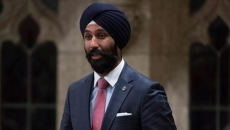SCHLOSS ELMAU, GERMANY - Canada will add 74 more people and businesses in Russia and Belarus to its sanctions list, Prime Minister Justin Trudeau announced on Monday as he met other G7 leaders in Germany to discuss the threat to global security posed by the invasion of Ukraine.
"Canada is unwavering in the belief that Ukrainians deserve to live in peace," Trudeau said in a written statement while he is attending the G7 leaders' summit.
"Vladimir Putin and his regime have caused untold pain and suffering in Ukraine and across the world. Together, with our G7 counterparts, Canada is stepping up our continuous and co-ordinated pressure to bring about the end of Vladimir Putin's war of choice."
Yes – our support for Ukraine, and for the Ukrainian people, remains steadfast. We reiterated that when President @ZelenskyyUa virtually joined #G7GER, and we recommitted to applying maximum pressure on the Russian regime and holding them accountable. https://t.co/0Zd5gEedwb
— Justin Trudeau (@JustinTrudeau) June 27, 2022
The new sanctions include 46 entities linked to the Russian defence sector, 15 Ukrainians who support the Russian occupation of the country and 13 people linked to government and defence and two entities in Belarus.
This morning, @Bundeskanzler Scholz and I covered plenty of ground – and spoke about supporting Ukraine with continued military, financial, and humanitarian assistance. We discussed the global impacts of Russia’s military aggression, and how we can address them together, too. pic.twitter.com/hVwSqY992Q
— Justin Trudeau (@JustinTrudeau) June 27, 2022
The Canadian government also plans to bring in sanctions against state-sponsored disinformation and propaganda agents controlled by senior government officials, Trudeau said, in an attempt to counter Kremlin disinformation.
Canada will also ban the export of advanced technologies that would improve Russia's domestic defence manufacturing capabilities.
Trudeau also announced that Canada, along with the United States, United Kingdom, and Japan, will ban the import of certain gold goods from Russia, shutting the commodity out of formal international markets.
Earlier Monday, Ukrainian President Volodymyr Zelenskyy held a two-hour meeting with G7 leaders at their summit in Germany. Zelenskyy, appearing virtually, told the leaders the country will need help to rebuild its infrastructure.
The leaders met in a bright and beautiful meeting room in Schloss Elmau, a veritable mountaintop castle surrounded by blooming meadows and stunning vistas.
Zelenskyy appeared on a small monitor looking down on the group, stone-faced, in front of a grey background.
The conflict in Ukraine has been a running theme through Trudeau's meetings with world leaders in Germany, as well as last week at the Commonwealth Heads of Government Meeting in Rwanda.
Zelenskyy thanked G7 leaders for their support, and laid out Ukraine's requests for tougher sanctions against Russia, more defensive military support, and help to rebuild the bombed and destroyed communities and infrastructure once the conflict subsides, according to Canadian government officials who provided a briefing on the condition they not be named.
He made the point that governments should start thinking about that work now.
Russia announced its own set of new sanctions against Canada on Monday, targeting 43 Canadians including the prime minister's former adviser Gerry Butts, former Bank of Canada governor Mark Carney and Conservative strategist Jenni Byrne.
Trudeau spoke to Zelenskyy on the first day of the G7 summit to inquire what he needs from the leaders. According to Zelenskyy's Twitter account, the two spoke about increasing defence support for the embattled country.
The heads of the world's most developed economies dedicated their first session of the day to discussing the war and listening to Zelenskyy's pleas for more aid.
Before the meeting, Trudeau and summit host Chancellor Olaf Scholz spoke during a walk from the manor building, or schloss in German, down to one of the meadows, nestled between the building and the mountain view.
"We are … cautious that we will help Ukraine as much as is possible, but that we also avoid that there will be a big conflict between Russia and NATO," Scholz told the media during a photo op with Trudeau.
The night before, in Ukraine's capital city Kyiv, weeks of general calm were shattered by Russian missile strikes. The missiles hit a kindergarten and a residential building, killing one man and injuring a woman and child, the city's mayor said.
While G7 leaders have been united in their condemnation of Russia, they are also expected to meet with Narendra Modi, India's prime minister, who has been invited to the summit but who also tightened economic and diplomatic ties with Russia in recent months.
Trudeau will meet with Modi one-on-one in a private meeting as well.
On Sunday, the United Kingdom announced new sanctions against Russia which would ban the import of Russian gold, the country’s biggest non-energy export.
The U.K. government says the same will apply to Canada, the United States and Japan, which, as a combined effort, would shut Russia out of formal markets. The idea is to "ratchet up pressure on Russia's war machine," squeezing the country out of funds to finance the conflict.
Russia was poised to default on its foreign debt on Sunday for the first time since the 1917 Bolshevik Revolution, further alienating the country from the global financial system.
Russia calls any default artificial because it has the money to pay its debts but says sanctions have frozen its foreign currency reserves held abroad.


.jpg)

